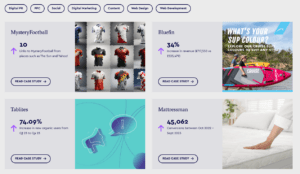
Eight local SEO content types to strengthen your strategy

Writing specific content for your specific geographical target audiences is key to an effective local SEO strategy. Aside from tasks like setting up Google My Business and adding schema markup, creating targeted content should be a big priority.
Whether you’re a small business operating in a UK town or a large corporation with multiple offices, there are various content types you can explore to help your website rank for geographical keywords.
Local content should be created and optimised with keyword research and SEO best practices. The goal? To appear in the search results for your offering, in your area.
Why is content for local SEO important?

I asked Senior Content Manager, Shona Worsman, whether businesses using local SEO should include content in their strategy:
“Absolutely,” she says.
“Content helps you optinise a website for geographical keywords.
Whether it’s in meta descriptions, alt tags, headers or body text, you’ll be in the best position to rank for local terms by targeting them with content and dedicated local landing pages (especially if you’re business operates on numerous locations).”
Website localisation can take time, but content optimisation will help ensure you rank for locally relevant keywords. Businesses that want to spread brand awareness, and increase revenue and foot traffic benefit hugely from localised content. However, local SEO content is more than just throwing keywords into blogs – it takes a strategic approach.
There are multiple facets to an SEO strategy that should not be overlooked. Think about the technical elements and authority building to strengthen your online presence.
Local businesses will find that when SEO is done well, they’ll achieve the following overtime:
- Enhanced visibility
- More foot traffic at their physical locations
- Increased brand recognition
- Expanded geographical keyword reach
- Competitive advantage
- Less advertising costs
- More sales and more conversion rates
So, you understand the benefits, it’s time to see how that works in action.
1. Location landing pages
If your business operates in multiple locations, localised landing pages are a must. This type of content generally attracts high-intent buyers, as users are actively looking for a particular service in their area. There are various kinds of information that these location pages should include:
- Physical address and phone number
- Local reviews and testimonials
- References to jobs/services carried out in that area
- Hours of operation
- Information about how the service works
- Local team member details
- Optional Google map embedded
- Further local information about where you are based
Location pages often see a high conversion rate, so long as they are perfectly optimised with local SEO and conversion in mind.
2. Reviews and case studies

Legitimacy and authenticity are two things that users often look for when looking for local services. Showcasing your authenticity through real-life case studies and reviews is key to getting your audience to trust you.
We recommend integrating things like Google and Tripadvisor reviews to demonstrate your expertise and experience in your sector and location.
Social proof is one of the most proven ways to build relationships and gain trust. Sharing evidence of happy customers, positive case studies and real before and after scenarios (where applicable) can help build a good reputation for local customers.
3. User-generated content
In the age of social media, businesses have access to multiple images and videos shared online by their clients. Your target audience will research for months before they finally decide, and who better to trust in their research than real-life people?
92% of consumers trust people they know for referrals, which is why experience-led content is so important.
Sure, you can sing and dance about yourself online all you like. What matters is the honest options of those who have experienced your services. User-generated content is credible and authentic, it’s 10 times more believable than any of your own content. Not only this, but it’s free and fast advertising – you just have to ask for permission to use it.
4. Visual content with cultural references 
Relatability is a concept that the best marketers leverage. People enjoy content that they can resonate with and recognise. Many beloved brands turn to people in their local communities to create content and make meaningful connections with their target audience.
Post videos and blog content of your team participating in local events, sharing experiences with local people, and showcasing your products and services within the context of the culture. Be relatable, be creative and be proud to show off your business’ home town!
For SEO purposes, visual content with optimised alt text, file names and website-friendly sizes will improve visibility. Just remember to consider file size so you don’t jeopardise those core web vital scores!
5. Question & answer blog content
When conducting local keyword research, you might find some search volume around questions in your niche. For example, ‘How much is X in Manchester?’ Or ‘Can I get an X in Manchester?’.
Search tools like AHrefs or SEMrush for this, but also pay attention to those ‘people also ask’ boxes on Google, they’ll give away exactly what local users are looking for.
Let’s imagine your website appears at position 1 in the SERP with quality and valuable information for every localised keyword/question. In that case, users will begin to recognise your brand and most importantly, know that you’re a go-to business offering what they’re interested in.
6. Informational guide content
If you don’t know already, the ‘messy middle’ is the complex stage in a user’s buying journey. The term describes the stages that a user goes through before they make a purchase decision. From the moment they discover their pain point or desire, right up to when they find a suitable solution, this user is in the midst of the ‘messy middle’.
Your job, as a local business owner, is to ‘show up’ in the very earliest stages of that journey right until the end. Informational guide content can help make that happen.
Suppose you are a hotel based in London, your SEO strategy should include improving visibility and traffic by ranking for various keywords. You would need to create guides around all things London and tourist-related. Think about your target audience and the types of research they might be doing, and create helpful content for those users.
Being informative and useful goes a long way in achieving higher rankings, improved visibility for a wider net of keywords and raising brand awareness.
7. Local business directories

You are missing out on substantial traffic and customers if you are not listing your business on local directories.
You should list your business on relevant directories such as Google My Business and Yelp. As a local business, you are more likely to show up in the search results first under GMB listings, so long as you do it correctly.
You should take care to provide accurate, consistent and up-to-date information about your business across all of these directories.
Using tools like GMB is a good way of keeping track of SEO reporting metrics such as impressions and clicks, so you can see how many people are actively looking for a service like yours.
8. Local news
As a business owner, you should demonstrate your active presence and understanding of your industry. Being aware of local industry news and presenting it on your own website is a good way of showing this.
Let’s take a property investment company in Liverpool as a good example. People within the industry and clients looking for an investment property will look for leaders, thought leadership and expertise. This type of business looking to improve their SEO should be first to publish new property developments in the area, new local partnerships, interesting investment opportunities and more.
Stay in tune with your industry and area, then post about it. It’s that simple.
Dominate local search results with Embryo
At Embryo, we’ve helped businesses big and small grow their online presence in their community. From producing high-converting landing pages to evergreen guides, our SEO and content teams know how to make a difference.
If you’re looking to get ahead of your competition and appear on page one of the search engine results for geographical keywords, give our team a shout today.
FAQs
Answered by our SEO team
Do my backlinks need to be local too?
Ideally, if your backlinks are also from local sources, then this would add value and credibility to your authority in that area. This shows to Google that you are your local area’s own go-to resource for expertise.
What are the benefits of optimising for a local audience?
If you have a physical store you can receive engagements via foot. This will improve your visibility. more conversions
What are the three pillars of local SEO?
The three main pillars of SEO are technical, content, and authority. Local SEO pillars consist of proximity, prominence and relevance
What type of keyword is best for local SEO?
Commercial intent is usually best for a local SEO strategy, such as ‘near me’ or ‘close to me’. Informational content also ranks highly if it is specific to an area.
Will local SEO content help me rank higher on Google Maps?
Google Maps uses Google My Business profiles. Optimise your GMB profile ensuring it matches your website. Star-ratings also have a huge impact on how highly you rank for a Google map search.
